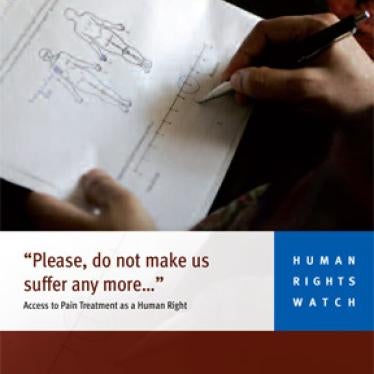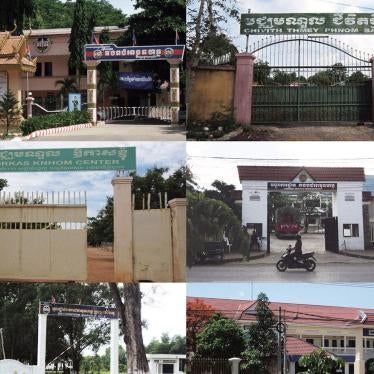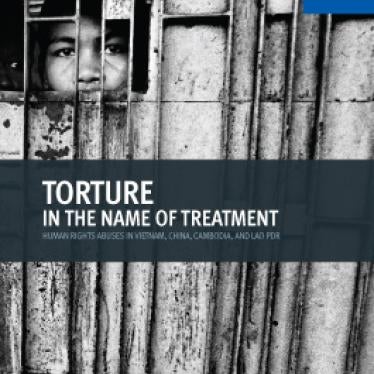(New Delhi) - Hundreds of thousands of patients in India unnecessarily experience excruciating pain, Human Rights Watch said in a report today. Restrictive drug regulations, lack of training for health care workers, and poorly integrated care result in needless suffering for patients because they cannot get inexpensive and effective pain medications.
The 102-page report, "Unbearable Pain: India's Obligation to Ensure Palliative Care," found that many major cancer hospitals in India do not provide patients with morphine, despite the fact that more than 70 percent of their patients are incurable and likely to require pain treatment and palliative care. Health centers offering services to people living with HIV similarly do not have morphine or doctors trained to prescribe it.
"India's health care system abandons so many patients to severe pain," said Diederik Lohman, senior health and human rights researcher at Human Rights Watch. "They are left to suffer; many told us that their pain was so bad they would prefer to die."
Severe pain is a common symptom among cancer patients, particularly during the last stages of the disease. It is estimated that more than 1 million advanced cancer patients in India experience severe pain in any given year. In addition, many other patients, including those with HIV, TB, or other infections or illness, may face acute or chronic severe pain.
The report identified three key obstacles to improving the availability of pain treatment and palliative care:
- Restrictive drug regulations. Many Indian states have excessively strict narcotics regulations that make it very difficult for hospitals and pharmacies to get morphine. In 1998, the central government recommended that states adopt modified regulations, but more than half of India's states have not done so.
- The failure to train doctors. Most medical students and young doctors receive no training on pain treatment and palliative care because the government does not include such instruction in relevant curricula. As a result, most doctors in India simply do not know how to assess or treat severe pain.
- Poor integration of palliative care into health services. National cancer and AIDS control programs do not contain meaningful palliative care components, thus depriving such care of public funds and relegating it to second-tier status.
"India is one of the world's largest legal producers of opium, the raw material for morphine," Lohman said. "But almost all of it is exported while hundreds of thousands - if not millions - of Indians suffer needlessly."
The report focuses specifically on the availability of pain treatment for cancer patients. It says that, based on official morphine consumption reports, fewer than 4 percent of patients with advanced cancer have access to appropriate pain treatment. The report also says that increased government funding for cancer has not emphasized palliative care.
"The Indian government deserves credit for investing in regional cancer centers and increasing funds for cancer control," Lohman said. "But without specific efforts to ensure that all cancer hospitals can treat pain and offer palliative care, these funds will do little to relieve the suffering for patients with advanced, incurable cancer."
The report is the first by an international human rights organization to examine access to pain relief medicines from a rights perspective. Human Rights Watch believes that governments have an obligation to ensure that essential medicines, including morphine, are available to patients and that health care workers receive adequate training in their use. The report says that the failure by the Indian government to fulfill this obligation violates the right to health.
Human Rights Watch further argues that the government's failure to ensure that cancer hospitals offer pain treatment may violate the prohibition against torture and cruel, inhuman and degrading treatment because of the widespread nature and severity of the suffering it causes. Human Rights Watch says that much of this suffering could be prevented with relatively basic and inexpensive steps.
Selected Quotes from Patients
"It felt as if someone was pricking me with needles. I just kept crying [throughout the night]. With that pain you think death is the only solution."
- Priya, Hyderabad, a woman with breast cancer
"My leg would burn like a chili on your tongue. The pain was so severe I felt like dying. I was very scared. I felt that it would be better to die than to have to bear this pain. [I thought], just remove the leg, then it will be alright. Just get rid of the leg so I'll be free of pain."
- Dilawar Joshi, Hyderabad, a Nepali man with a bone tumor
"I would sleep maybe an hour and a half per night. I could take any number of sleeping pills [without effect]. With morphine, I can relax. This place [the palliative care unit] is heaven-sent..."
- Shruti Sharma, Hyderabad, a breast cancer patient
"I had pain in my back and both legs. My legs twisted into an abnormal position. My legs would turn inside and my toes up. It was a pricking pain that was excruciating. I could not sleep as the pain was particularly bad at night."
- Pillai, Trivandrum, a patient with spinal TB and HIV
"I developed severe pain all over the abdomen and in the area of my genitals. It was a continuous, throbbing pain that radiated to the back. It made me very irritable and frustrated. I went back to the doctor three or four times to say that I had pain and wasn't getting any relief. I would get new medicines but they would still provide no relief."
- Kamala Kanwar, Jaipur, patient with cervical cancer







